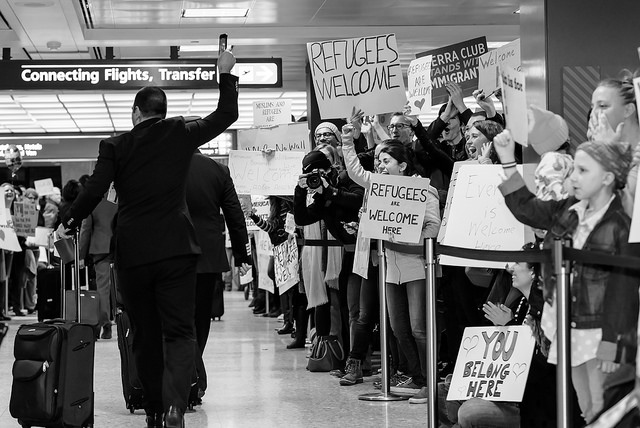As previously reported, the U.S. Supreme Court recently announced that the court will be hearing arguments in defense of and in opposition to the President’s controversial executive order “Protecting the Nation from Foreign Terrorist Entry into the United States,” also known as the “travel ban” in October of this year.
In the meantime, the Supreme Court has allowed some parts of the President’s executive order to take effect until it makes a final ruling later this year. This means that certain foreign nationals will be prevented from gaining admission to the United States. Today, the Department of State announced that per the Supreme Court’s instructions, the President’s 90-day temporary suspension will be implemented worldwide at 8:00 PM (EST) beginning today, June 29, 2017.
Who will be affected?
Foreign nationals from the six countries of concern mentioned in the President’s executive order, including Syria, Sudan, Somalia, Iran, Libya, and Yemen, who do not have a bona fide relationship with a person, entity (such as a religious or academic institution), or employer in the United States, will not be granted admission to the United States for a period of 90 days, beginning, June 29, 2017 8:00 PM EST, unless the foreign national can demonstrate that they have a credible qualifying bona fide relationship with a person, employer, or entity in the United States. Such individuals may qualify for a case-by-case waiver.
In addition, refugees will not be admitted to the United States for a period of 90 days, beginning June 29, 2017 8:00 PM EST, unless they can demonstrate a legitimate claim of “concrete hardship,” to be weighed against the country’s concern for its national security.
In other words, foreign nationals from Syria, Sudan, Somalia, Iran, Libya, and Yemen who do not have a bona fide relationship with a family member in the United States, and do not have a bona fide pre-existing relationship with a U.S. employer or entity, will not be eligible to travel to the United States.
Who will not be affected?
- US citizens
- Legal permanent residents (green card holders)
- Current U.S. visa holders
- Any visa applicant who was in the US as of June 26, 2017
- Dual nationals
- Anyone who has already been granted asylum
- Any refugee who has already been admitted to the US
- Foreign nationals with “bona fide” family, educational or business ties to the US
- U.S. Visas that have already been approved will not be revoked
As specified above, individuals from the countries of concern specified above who have a bona fide relationship with an immediate family member, have a job offer from an American employer, a working relationship with a U.S. entity, have university acceptance, etc. will not be barred from admission, however there must be formal evidence documenting such a relationship, and the foreign national must have abided by the law. Foreign nationals who have already been granted U.S. visas, will not have their visas revoked as a result of the executive order.
Since it is still unclear how immigration officials will be implementing the Supreme Court’s order, even travelers who have a bona fide relationship with a U.S. family member, employer, entity, should be very cautious while traveling.
Individuals must ensure that they keep evidence of their bona fide relationship with them while traveling in and out of the United States.
Such documents may include formal documentation issued by USCIS, the National Visa Center, or U.S. Embassy or Consular unit, such as approval notices, receipt notices, signed offers of employment on formal company letterhead, signed employment contracts, evidence of work in the United States such as wage statements, and any other supporting documentation to prove the individual’s lawful immigrant status in the United States, in addition to the foreign national’s valid U.S. visa.
If eligible to travel, adjustment of status applicants should carry their valid passports, advance parole document, work permit, I-130 and I-485 receipt notices, marriage certificate if the adjustment of status is through marriage, evidence of cohabitation, evidence of commingling of finances, and birth certificates of any children born to the marriage, as proof of their bona fide relationship.
Students should carry their valid passports, valid student visas, official I-20s, university acceptance letter, transcripts, and evidence of formal academic enrollment, as proof of their bona fide relationship to their academic institution.
Please note: this is not an exhaustive list, documentation required will vary depending on the type of qualifying relationship the foreign national has in the United States.
Please stay tuned for more information.

